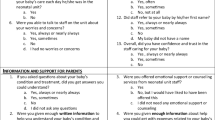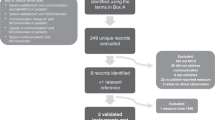Abstract
Objective:
Communicating with families is a core skill for neonatal clinicians, yet formal communication training rarely occurs. This study examined the impact of an intensive interprofessional communication training for neonatology fellows and nurse practitioners.
Study Design:
Evidence-based, interactive training for common communication challenges in neonatology incorporated didactic sessions, role-plays and reflective exercises. Participants completed surveys before, after, and one month following the training.
Result:
Five neonatology fellows and eight nurse practitioners participated (n=13). Before the training, participants overall felt somewhat prepared (2.6 on 5 point Likert-type scale) to engage in core communication challenges; afterwards, participants overall felt very well prepared (4.5 on Likert-type scale) (P<0.05). One month later, participants reported frequently practicing the taught skills and felt quite willing to engage in difficult conversations.
Conclusion:
An intensive communication training program increased neonatology clinicians’ self-perceived competence to face communication challenges which commonly occur, but for which training is rarely provided.
This is a preview of subscription content, access via your institution
Access options
Subscribe to this journal
Receive 12 print issues and online access
$259.00 per year
only $21.58 per issue
Buy this article
- Purchase on Springer Link
- Instant access to full article PDF
Prices may be subject to local taxes which are calculated during checkout

Similar content being viewed by others
References
Azoulay E, Pochard F, Kentish-Barnes N, Chevret S, Aboab J, Adrie C et al. Risk of post-traumatic stress symptoms in family members of intensive care unit patients. Am J Respir Crit Care Med 2005; 171: 987–994.
Abbott KH, Sago JG, Breen CM, Abernethy AP, Tulsky JA . Families looking back: one year after discussion of withdrawal or withholding of life-sustaining support. Crit Care Med 2001; 29: 197–201.
Lautrette A, Darmon M, Megarbane B, Joly LM, Chevret S, Adrie C et al. A communication strategy and brochure for relatives of patients dying in the ICU. N Engl J Med 2007; 356: 469–478.
Meert KL, Thurston CS, Thomas R . Parental coping and bereavement outcome after the death of a child in the pediatric intensive care unit. Pediatr Crit Care Med 2001; 2: 324–328.
Meyer EC, Ritholz MD, Burns JP, Truog RD . Improving the quality of end-of-life care in the pediatric intensive care unit: parents' priorities and recommendations. Pediatrics 2006; 117: 649–657.
Melnyk BM, Alpert-Gillis L, Feinstein NF, Crean HF, Johnson J, Fairbanks E et al. Creating opportunities for parent empowerment: program effects on the mental health/coping outcomes of critically ill young children and their mothers. Pediatrics 2004; 113: e597–e607.
Boss RD, Hutton N, Sulpar LJ, West AM, Donohue PK . Values parents apply to decision-making regarding delivery room resuscitation for high-risk newborns. Pediatrics 2008; 122: 583–589.
Henley A, Schott J . The death of a baby before, during or shortly after birth: good practice from the parents' perspective. Semin Fetal Neonatal Med 2008; 13: 325–328.
Accreditation Council for Graduate Medical Education. ACGME Program Requirements for Graduate Medical Education in the Subspecialties of Pediatrics. Available from http://www.acgme.org/acWebsite/downloads/RRC_progReq/320_pediatrics_subs_01012007.pdf 2011, [cited 10 July 2012].
National Organization of Nurse Practitioner Faculties Nurse Practioner Core Competencies. Available from http://www.nonpf.com/associations/10789/files/NPCoreCompetenciesFinal2012.pdf 2012, [cited 10 July 2012].
Boss RD, Hutton N, Donohue PK, Arnold RM . Neonatologist training to guide family decision making for critically ill infants. Arch Pediatr Adolesc Med 2009; 163: 783–788.
Armentrout D, Cates LA . Informing parents about the actual or impending death of their infant in a newborn intensive care unit. J Perinat Neonatal Nurs 2011; 25: 261–267.
Back AL, Arnold RM, Tulsky JA, Baile WF, Fryer-Edwards KA . Teaching communication skills to medical oncology fellows. J Clin Oncol 2003; 21: 2433–2436.
Back AL, Arnold RM, Baile WF, Fryer-Edwards KA, Alexander SC, Barley GE et al. Efficacy of communication skills training for giving bad news and discussing transitions to palliative care. Arch Intern Med 2007; 167: 453–460.
Kelley AS, Back AL, Arnold RM, Goldberg GR, Lim BB, Litrivis E et al. Geritalk: communication skills training for geriatric and palliative medicine fellows. J Am Geriatr Soc 2012; 60: 332–337.
Clayton JM, Adler JL, O'Callaghan A, Martin P, Hynson J, Butow PN et al. Intensive communication skills teaching for specialist training in palliative medicine: development and evaluation of an experiential workshop. J Palliat Med 2012; 15: 585–591.
Boss RD, Donohue PK, Arnold RM . Adolescent mothers in the NICU: how much do they understand? J Perinatol 2010; 30: 286–290.
Mack JW, Hilden JM, Watterson J, Moore C, Turner B, Grier HE et al. Parent and physician perspectives on quality of care at the end of life in children with cancer. J Clin Oncol 2005; 23: 9155–9161.
Alderson P, Hawthorne J, Killen M . Parents' experiences of sharing neonatal information and decisions: consent, cost and risk. Soc Sci Med 2006; 62: 1319–1329.
Miquel-Verges F, Woods SL, Aucott SW, Boss RD, Sulpar LJ, Donohue PK . Prenatal consultation with a neonatologist for congenital anomalies: parental perceptions. Pediatrics 2009; 124: e573–e579.
Wocial LD . Life support decisions involving imperiled infants. J Perinat Neonatal Nurs 2000; 14: 73–86.
Breen CM, Abernethy AP, Abbott KH, Tulsky JA . Conflict associated with decisions to limit life-sustaining treatment in intensive care units. J Gen Intern Med 2001; 16: 283–289.
Azoulay E, Timsit JF, Sprung CL, Soares M, Rusinova K, Lafabrie A et al. Prevalence and factors of intensive care unit conflicts: the conflicus study. Am J Respir Crit Care Med 2009; 180: 853–860.
Carlet J, Thijs LG, Antonelli M, Cassell J, Cox P, Hill N et al. Challenges in end-of-life care in the ICU. Statement of the 5th International Consensus Conference in Critical Care: Brussels, Belgium, April 2003. Intensive Care Med 2004; 30: 770–784.
Poncet MC, Toullic P, Papazian L, Kentish-Barnes N, Timsit JF, Pochard F et al. Burnout syndrome in critical care nursing staff. Am J Respir Crit Care Med 2007; 175: 698–704.
Piers RD, Azoulay E, Ricou B, Dekeyser Ganz F, Decruyenaere J, Max A et al. Perceptions of appropriateness of care among European and Israeli intensive care unit nurses and physicians. JAMA 2011; 306: 2694–2703.
Aslakson RA, Wyskiel R, Thornton I, Copley C, Shaffer D, Zyra M et al. Nurse-Perceived barriers to effective communication regarding prognosis and optimal end-of-life care for surgical ICU patients: a qualitative exploration. J Palliat Med 2012; 15: 910–915.
Nelson JE, Angus DC, Weissfeld LA, Puntillo KA, Danis M, Deal D et al. End-of-life care for the critically ill: a national intensive care unit survey. Crit Care Med 2006; 34: 2547–2553.
Ahrens T, Yancey V, Kollef M . Improving family communications at the end of life: implications for length of stay in the intensive care unit and resource use. Am J Crit Care 2003; 12: 317–323 discussion 324.
Lilly CM, Sonna LA, Haley KJ, Massaro AF . Intensive communication: four-year follow-up from a clinical practice study. Crit Care Med 2003; 31: S394–S399.
Shelton W, Moore CD, Socaris S, Gao J, Dowling J . The effect of a family support intervention on family satisfaction, length-of-stay, and cost of care in the intensive care unit. Crit Care Med 2010; 38: 1315–1320.
Interprofessional Education Collaborative Expert Panel. Core Competencies for Interprofessional Collaborative Practice: Report of an Expert Panel. Washington, DC, 2011.
Curtis JR, Ciechanowski PS, Downey L, Gold J, Nielsen EL, Shannon SE et al. Development and Evaluation of an interprofessional communication intervention to improve family outcomes in the ICU. Contemp Clin Trials 2012; 33 (6): 1245–1254.
Meyer EC, Brodsky D, Hansen AR, Lamiani G, Sellers DE, Browning DM . An interdisciplinary, family-focused approach to relational learning in neonatal intensive care. J Perinatol 2011; 31: 212–219.
Acknowledgements
This program was supported by grants from the Arthur Vining Davis Foundations. Dr Arnold receives support from the Jewish Health Care Foundation and support from Lawrence Stern. The authors would like to acknowledge the dedicated support of Lori Spahr.
Author information
Authors and Affiliations
Corresponding author
Ethics declarations
Competing interests
The authors declare no conflict of interest.
Rights and permissions
About this article
Cite this article
Boss, R., Urban, A., Barnett, M. et al. Neonatal Critical Care Communication (NC3): training NICU physicians and nurse practitioners. J Perinatol 33, 642–646 (2013). https://doi.org/10.1038/jp.2013.22
Received:
Revised:
Accepted:
Published:
Issue Date:
DOI: https://doi.org/10.1038/jp.2013.22
Keywords
This article is cited by
-
Measuring antenatal counseling skill with a milestone-based assessment tool: a validation study
BMC Medical Education (2023)
-
Words matter: exploring communication between parents and neonatologists
Journal of Perinatology (2022)
-
Improving communication with parents: the Neonatal Intensive Care Unit Empathy Workshop
Journal of Perinatology (2020)
-
Neonatal palliative care: perception differences between providers
Journal of Perinatology (2020)
-
Families as educators: a family-centered approach to teaching communication skills to neonatology fellows
Journal of Perinatology (2019)



